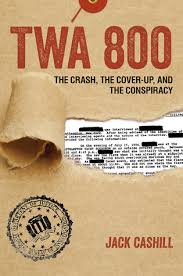Paramount Owes America
An Apology For Jay-Z's Trayvon Series
![]()

Order Jack Cashill's latest book, TWA 800: The Crash, the Cover-Up, and the Conspiracy
![]()

About Silenced: Flight 800
and the Subversion
of Justice (DVD) -
-Buy the Silenced DVD-
![]()
© Jack Cashill
August 1, 2018 - AmericanThinker.com
On Monday evening, the Paramount Networks aired the first part of a six-part documentary series on the death of Trayvon Martin called “Rest in Power: The Trayvon Martin Story.”
If multi-media impressario Shawn “Jay-Z” Carter had chosen to tell it, there was a story to be told here: a story about a boy bounced around among his biological parents and other relatives after his parents’ divorce; a story of a boy whose descent into drugs, guns, fighting, and burglary accelerated after his father left his stepmother, Alicia, his “rock,” when Trayvon was 15.
There was a story to be told of how Trayvon’s school shielded him from the criminal justice system--much as the schools in neighboring Broward County shielded Parkland’s Nikolas Cruz--even after Trayvon was apprehended at school with a weapon, a burglary tool, and stolen jewelry.
This cautionary tale of abandonment and betrayal was not the one Jay-Z chose to tell. Instead, he submitted his audience to a TV-hour of racially incendiary hokum shamelessly untethered from the inarguable facts of the case. The next five hours will not be any better.
The testimony of Trayvon’s parents, Tracy Martin and Sybrina Fulton dominated the opening hour. Their grief seemed real enough, but instead of accepting responsibility for their son’s chaotic life, they projected their guilt onto the marginalized, dehumanized “other” of this story, George Zimmerman, the man who was forced to shoot Trayvon in February 2012 to save his own life.
The Martin family knew better. By the time a deposition was taken with Tracy Martin a year after the shooting, Tracy, Sybrina and the various attorneys representing the Martins were aware of Trayvon’s potential for violence. What details Tracy may not have known, he learned during the deposition.
“Were you aware that he was suspended from school in the fall of 2011 for possession of the weapon and the jewelry?” George Zimmerman’s attorney Don West asked Tracy.
“Did Sybrina Fulton ever tell you in the fall of 2011 or in early 2012 that Trayvon was being considered for expulsion?” asked West again.
“Were you aware sometime in November of 2011 that Trayvon was kicked out of Sybrina's house?” The producers spare the audience all such inconvenient details.
Instead, this first hour detailed Team Martin’s heroic effort to force the State of Florida to arrest George Zimmerman. The state’s failure to do so immediately, the producers insinuate, was racist.
The hour concluded with the release, under pressure, of the 911 tapes. On one tape, a man could be heard screaming desperately for help for more than 40 seconds. Said Tracy on camera, “I know my son’s voice. I know it was him.” Sybrina said the same. For Tracy, the release of the 911 tape “was the game changer,” the one bit of evidence that made Zimmerman’s arrest inevitable.
In the real world, the SPD did not try to bury the 911 tapes. Its officers played them for Tracy two days after the shooting. The Orlando Sentinel reported at the time, “It was Zimmerman [crying out], Serino said. He said he is certain of that because he played a recording of that voice for Trayvon's father, Tracy Martin, and the Miami man said the voice was not his son's." SPD investigator Chris Serino was not interviewed for the documentary.
Most conspicuously absent from the first hour was Jon Good, the closest of the eyewitnesses to the shooting. Good told the Sanford PD immediately after the shooting, “So I open my door. It was a black man with a black hoodie on top of the other, either a white guy or now I found out I think it was a Hispanic guy with a red sweatshirt on the ground yelling out help! And I tried to tell them, get out of here, you know, stop or whatever, and then one guy on top in the black hoodie was pretty much just throwing down blows on the guy kind of MMA [mixed martial arts]-style.”
Of all the witnesses to testify at the trial, Good was easily the most coherent and convincing. As Good clearly testified, Zimmerman was “yelling out help” while he was being attacked. “Rest in Power” viewers were spared all of this. The producers left them with the lingering impression that “the little dead black boy” was the one who had been yelling “help” but for no discernible reason.
In their lowest blow, the producers treated Zimmerman as a cigar-smoking tool of white supremacists and the NRA. The spurious references to Florida’s “Stand Your Ground” law served no larger purpose than to make villains of the NRA and then Gov. Jeb Bush. Stand Your Ground was fully irrelevant to Zimmerman’s defense. The occasional images of Klansmen and Confederate flag wavers served no purpose other than to inflame.
There was no reference at all to Zimmerman’s mentoring of two black teens, his work with the homeless, his open support for Barack Obama, or even his Hispanic roots. Zimmerman had been named after his uncle Jorgé. Had he been named Jorgé instead of George, the story would never have left Sanford. In a battleground state, in an election year, the media would have wanted no piece of a story in which a “Jorgé” shot a “Trayvon.”
Ironically, a judge dismissed Zimmerman’s later defamation lawsuit against NBC, claiming he had made himself a public figure by "voluntarily injecting his views into the public controversy surrounding race relations and public safety in Sanford.” He did this a year before the shooting. At the time, Zimmerman prodded the NAACP to launch a public protest over the failure of the Sanford Police Department to arrest the son of a white officer who had beaten a homeless black man. Zimmerman testified publicly. His efforts led to the firing of Sanford’s police chief.
Unfortunately for Zimmerman, his work on behalf of the homeless man, Sherman Ware, was not “public” enough. The producers felt comfortable ignoring it altogether. They did, however, use the testimony of local attorney Natalie Jackson to imply that Zimmerman and the residents of his community were racist. If Jackson mentioned that she worked with Zimmerman on the Sherman Ware case, that bit did not make the final cut.
In the most honest moment of “Rest in Power,” Tracy Martin concedes, “Then he started doing things teenagers do.” In reality, Martin was doing what too many young black men abandoned by their parents do when left to the streets and their own wiles. Had Zimmerman not shot Trayvon, Trayvon would have been sent to jail. His attack on Martin was that vicious and unprovoked.
“If you leave out absolutely everything that might give your ‘narrative’ a problem and throw in any old rubbish that might support it, and you don’t even care that one bit of rubbish flatly contradicts the next bit, and you give no chance to those who might differ, than you have betrayed your craft,” wrote the late Christopher Hitchens in his review of Michael Moore’s Fahrenheit 911.
In the first hour of “Rest in Power,” Jay-Z and the Paramount Network betrayed their craft, inflamed the black community, and endangered an innocent man. And there are still five parts left to go.

Jack Cashill is the author of If I Had A Son: Race, Guns, and the Railroading of George Zimmerman.
